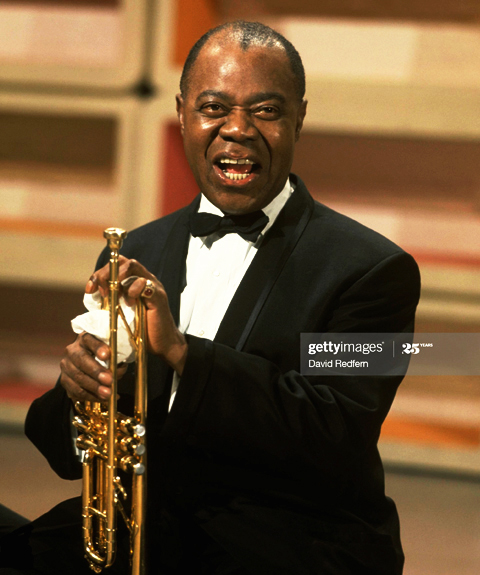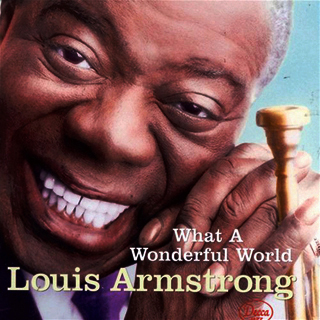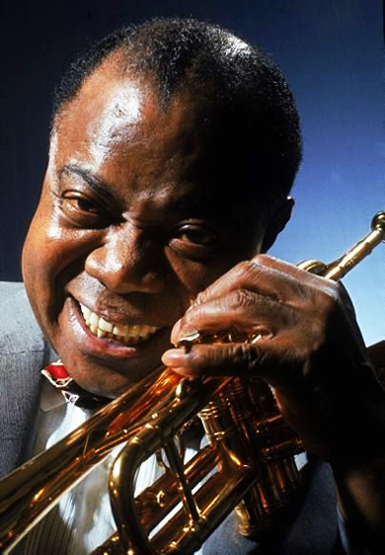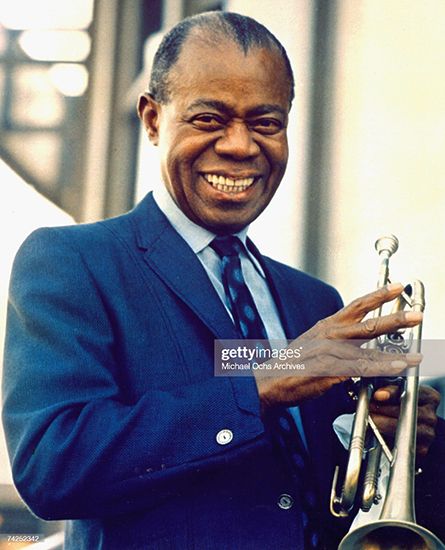What a Wonderful World (versión original)
1967.
En 1967 Louis Armstrong grabó «What a Wonderful World», escrita por el productor discográfico Bob Thiele y el compositor y arreglista George David Weiss, sin trompeta y con su voz grave en medio de un lecho de cuerdas y voces angelicales. La canción no se promocionó bien en Estados Unidos, pero encabezó la lista de singles del Reino Unido. En un episodio de 1978 de The Muppet Show, el perro Rowlf se la canta a un cachorro, y ese mismo año apareció en las escenas finales de la serie radiofónica de la BBC The Hitchhiker’s Guide to the Galaxy, repitiéndose para la adaptación televisiva de la serie realizada por la BBC en 1981. En 1987, «What a Wonderful World» se incluyó en la banda sonora de la película de comedia y drama bélico Good Morning, Vietnam y se reeditó como sencillo, alcanzando el nº 32 en la lista Billboard Hot 100 y el nº 1 en las listas de Bélgica y Australia, y también es la canción de cierre de la película de ciencia ficción de 1995 12 Monkeys.
In 1967 Louis Armstrong recorded “What a Wonderful World” written by record producer Bob Thiele and songwriter and arranger George David Weiss, with no trumpet and his gravelly voice in the middle of a bed of strings and angelic voices. The song wasn’t well promoted in the United States, but topped the UK Singles Chart and the Ö3 Austria Top 40. In an 1978 episode of The Muppet Show, Rowlf the Dog sings it to a puppy, and the same year it was featured in the closing scenes of BBC radio’s The Hitchhiker’s Guide to the Galaxy, being repeated for BBC’s 1981 television adaptation of the series. In 1987 “What a Wonderful World” was included in the soundtrack of the comedy-drama war film Good Morning, Vietnam and was re-released as a single, hitting No. 32 on the Billboard Hot 100 and No. 1 at the Belgium and Australian charts, and it’s also the closing song for the 1995 science fiction movie 12 Monkeys.

Louis Armstrong

Cubierta de «What a Wonderful World»
En 1969 Armstrong no pudo actuar debido a problemas en los riñones y el corazón, y su mánager de muchos años Joe Glaser falleció, pero en 1970 se recuperó y volvió a hacer una gira mundial. Sin embargo, en 1971 tuvo un ataque al corazón y fue hospitalizado durante dos meses. Después de ser dado de alta murió de otro ataque al corazón mientras dormía el 6 de julio a los 69 años de edad. Louis Armstrong fue enterrado en Queens (Nueva York), donde había residido desde 1943, y a su funeral asistieron más de veinte mil personas, siendo emitido por la televisión.
In 1969 Armstrong was unable to perform due to kidney and heart problems, and his longtime manager Joe Glaser passed away, but in 1970 he recovered and went back on a world tour. Nevertheless, in 1971 he had a heart attack and was hospitalized for two months. After being discharged he died of another heart attack while sleeping on July 6th at the age of 69. Louis Armstrong was buried in Queens, New York, where he had resided since 1943, and his funeral was attended by more than twenty thousand people and broadcast on television.

Louis Armstrong
In 1972, un años después de su muerte, recibió un premio Grammy a toda su carrera y once de sus singles más importantes, como «West End Blues» de 1928 y «Mack the Knife» de 1955, y el álbum Porgy and Bess de 1958, han sido incluidos en el premio Grammy al salón de la fama, un galardón que se concede a las grabaciones que tienen importancia histórica. También tiene una estrella en el paseo de la fama de Hollywood. En las décadas de los ochenta y los noventa, trompetistas de jazz afroamericanos más jóvenes, como los célebres Wynton Marsalis, Jon Faddis y Nicholas Payton, destacaron la importancia de Armstrong como músico y ser humano. Hoy en día sigue siendo considerado como el rey del jazz.
In 1972, a year after his death, Armstrong received a Grammy Lifetime Achievement Award and eleven of his most important singles, like 1928’s “West End Blues”, 1938’s “When the Saints Go Marching In”, 1955’s “Mack the Knife” and 1964’s “Hello, Dolly”, as well as the 1958’s album Porgy and Bess, have been inducted into the Grammy Hall of Fame, an award given to recordings that have historical significance. He also has a star on the Hollywood Walk of Fame. In the 1980s and 1990s younger African-American jazz trumpeters like renowned Wynton Marsalis, Jon Faddis and Nicholas Payton stressed Armstrong’s importance both as a musician and a human being. He’s still today regarded as the “King of Jazz”.

Louis Armstrong
Translated with the help of DeepL
https://www.youtube.com/watch?v=MFFM4dxC1kk

What a Wonderful World (en la televisión)

https://www.youtube.com/watch?v=VqhCQZaH4Vs
